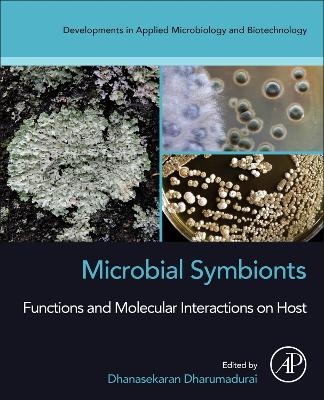
Microbial Symbionts
Academic Press Inc (Verlag)
978-0-323-99334-0 (ISBN)
The book will also helps users plan and execute experiments with appropriate knowledge rather than experimental trial and error in a wide range of disciplines, including Microbiology, Biotechnology, Botany and Zoology.
Dr. Dharumadurai Dhanasekaran is a Professor in the Department of Microbiology, Principal Investigator in National Repository for Microalgae and Cyanobacteria—Freshwater (NRMC-F) at Bharathidasan University in Tiruchirappalli, India. His research experience is in the fields of actinobacteriology and mycology. His current research focuses on probiotic microorganisms and postbiotics and microbiome profiling in plant and animal system. He has been awarded an UGC-Raman Post-Doctoral Fellowship and has worked in the Department of Molecular, Cellular, and Biomedical Sciences at the University of New Hampshire in Durham, USA. He studied the genome properties of probiotic bacteria by whole genome, metagenome sequencing, and formulated probiotic feed supplements for dairy cow. He edited 17 books with international publishers and served as a reviewer, guest editor, and on the editorial boards of national and international journals.
Section I: Microbial symbionts of plants: functions and molecular interactions with the host
1. Cyanobacterial symbionts from plants bryophyte, pteridophyte, gymnosperm, angiosperm
2. Frankia from actinorhizal plants
3. Rhizobium from leguminous plants
4. Fungal mycorrhiza from plants roots
5. Photobionts and mycobionts from lichen
6. Symbiotic fungal endophytes
7. Invitro Symbiotic nitrogen fixation on legume plants
8. Screening of symbiotic ability of Rhizobium under hydrophonic conditions
9. Arbuscular mycorrhizal community analysis from a grassland ecosystem
10. Cyanobacterial symbionts in Cycad coralloid roots
11. Mass production of cyanobacterial symbionts, Rhizobium, Frankia, VAM fungi
Section II: Microbial symbionts of Animals: functions and molecular interactions with the host
1. Symbiotic microbes from ciliates
2. Symbiotic microbes from bivalves
3. Symbiotic microbes from crustaceans
4. Symbiotic microbes from oligochaete
5. Symbiotic microbes from polychaete worms
6. Symbiotic microbes from gastropods
7. Symbiotic microbes from sponges
8. Symbiotic microbes from corals
9. Symbiotic microbes from Pig gut
10. Symbiotic microbes from Reindeer rumen
11. Vibrio fischeri from Squid light organ
12. Symbiotic microbes from Human gut
Section III: Microbial symbionts of Insects: functions and molecular interactions with the host
1. Primary and Secondary endosymbiont Aphids: Buchnera sp.
2. Microbial symbionts of herbivorous insect
3. Microbial symbionts from Termite gut
4. Endosymbionts: Wolbachiaspp from Anthropods
5. Endosymbionts: Wolbachiaspp from nematodes
6. Burkholderia from Stinkbug midgut
Section IV: Molecular methods and Interactions of Microbial Symbionts
1. Molecular interactions on colonization, establishment and maintenance of microbial communities/symbionts
2. Metagenomics analysis of Microbial Symbionts in root nodules, corals, sponges, lichens
3. Functional metagenomics profiling of symbiotic microbiome
4. Holobiont analysis of root nodules, corals, sponges, lichens
5. Key Model systems in animal-microbe and plant-microbe beneficial interactions
6. Culture-independent and dependent approaches in symbionts analysis
7. In situ techniques to study non-cultivable microbial symbionts
8. Omics Approach for the microbiome Function analysis of lichens, root nodules
9. Sponge and Coral reef
10. Modern techniques for identification, localization and functional characterization of host-associated microbes
11. Autofluorescence in methanogenic, archaeal endosymbionts
12. Exoproteme analysis of symbiotic signaling molecules in Frankia, Rhizobium
13. Transcriptome analysis of symbiotic microbes
14. Metaproteome analysis of symbiotic microbes
15. Metabolic analysis of symbiotic microbes
16. Quorum sensing relationship analysis of microbial symbionts
17. Biosynthetic gene cluster analysis in symbiotic microbes
| Erscheinungsdatum | 10.10.2022 |
|---|---|
| Reihe/Serie | Developments in Applied Microbiology and Biotechnology |
| Verlagsort | Oxford |
| Sprache | englisch |
| Maße | 191 x 235 mm |
| Gewicht | 450 g |
| Themenwelt | Naturwissenschaften ► Biologie ► Mikrobiologie / Immunologie |
| ISBN-10 | 0-323-99334-6 / 0323993346 |
| ISBN-13 | 978-0-323-99334-0 / 9780323993340 |
| Zustand | Neuware |
| Haben Sie eine Frage zum Produkt? |
aus dem Bereich


